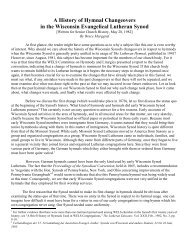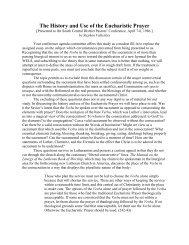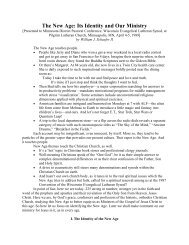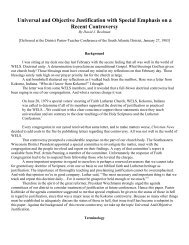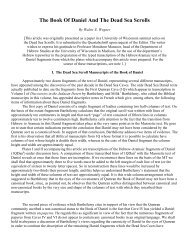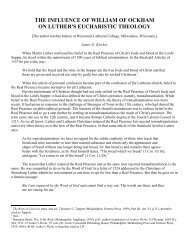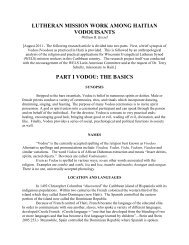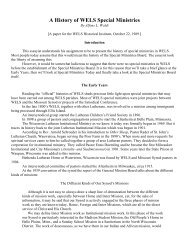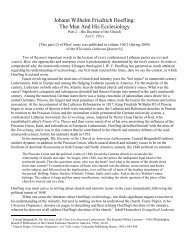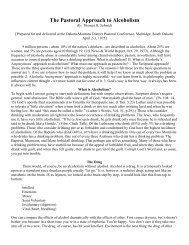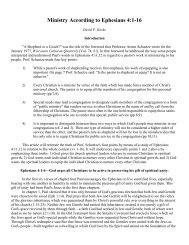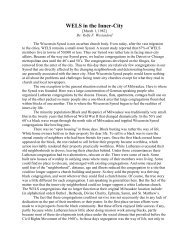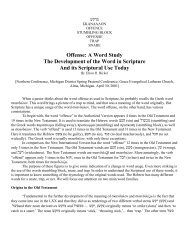Strangers to Sisters - Wisconsin Lutheran Seminary Library: Essays
Strangers to Sisters - Wisconsin Lutheran Seminary Library: Essays
Strangers to Sisters - Wisconsin Lutheran Seminary Library: Essays
You also want an ePaper? Increase the reach of your titles
YUMPU automatically turns print PDFs into web optimized ePapers that Google loves.
this is definitely a <strong>Lutheran</strong> principle. Errors arise in the<br />
church when theologians start with dogmatic statements,<br />
whether their own or those of famous “fathers,” and use<br />
Scripture only <strong>to</strong> support the preconceived notions thus<br />
derived, instead of starting with the Scriptures and proving<br />
all dogma from them. 268<br />
Furthermore, Lillegard continues,<br />
Pieper and Koehler claimed that their views on church and<br />
ministry were in harmony with Dr. Walther’s view, and<br />
that the opposite views were in reality a departure from<br />
Walther as well as from the Scriptures. They did not reject<br />
the use of “the fathers” <strong>to</strong> prove that a certain teaching is a<br />
genuine <strong>Lutheran</strong> teaching, nor did they question the<br />
orthodoxy of the Luther, Walther, etc. They only warned<br />
against using their statements <strong>to</strong> prove points which these<br />
in reality did not discuss or treat at all. 269 (Emphasis mine)<br />
Lillegard then goes on <strong>to</strong> show that many of the arguments that Buenger advances<br />
are not only on shaky exegetical grounds, but also shaky his<strong>to</strong>rical and confessional<br />
grounds. For instance, Buenger had stated, “While the invisible church began with the<br />
preaching of John the Baptist, the first Christian Church in the sense of a visible body<br />
was founded by the Holy Ghost himself as a local congregation at Jerusalem.” 270<br />
Lillegard eviscerates this premise by quoting Matthew 18, Matthew 16, Matthew 10, and<br />
John 9. On <strong>to</strong>p of this, Lillegard advances, was the Church not already established in the<br />
Old Testament? 271 Furthermore, Lillegard insists that the Confessional writings do not<br />
say anything about the divine institution of the local congregation or the local pas<strong>to</strong>rate.<br />
They certainly do not support the idea that all other offices are subordinate <strong>to</strong> the local<br />
pas<strong>to</strong>rate. He states,<br />
268 Lillegard, Church and Ministry, 3.<br />
269 Ibid.<br />
270 Lillegard, Church and Ministry, 4.<br />
271 Lillegard, Church and Ministry, 5.<br />
145



